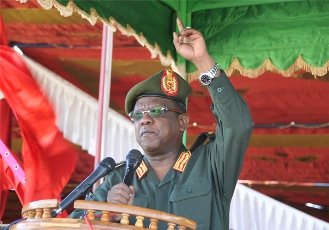Captured Islamist extremists planned assassination of officials – Sudan’s security chief says
December 4, 2012 (KHARTOUM) – The head of Sudan’s security apparatus said on Tuesday that the cell of Islamist extremists captured by the authorities in a central province this week was planning to assassinate local officials and target Western diplomatic missions in the country.

But well-placed sources told Sudan Tribune that they doubt the death toll given by the government, saying that the gun battle between government forces and the group lasted for nearly six hours and many dead bodies were burned in the fire that erupted in the grasslands around the camp. They also said more than 13 of the extremists were killed in the raid that happened one month after the group attacked a Wildlife Police station in Galgo area in Al-Dinndir and seized amounts of arms and military equipments.
In a speech he delivered at the security coordinative conference of East Sudan state in Port Sudan, Mohammed Atta, the director-general of the National Intelligence and Security Services (NISS), said that 31 young extremist elements had setup a camp in Al-Dinndir to train for executing terrorism operations to target some state figures, Western diplomatic missions and international troops in Khartoum.
Atta said that some of the group’s members had participated in similar activities in the past. He added that the authorities seized a number of unspecified amounts of arms, ammunition, explosive materials and communication devices in the raid. He said that the group’s members were arrested after an “epic” battle.
An eye witnesses told Sudan Tribune that a convoy of at least a 20 government vehicles were involved in the gun battle that erupted around the camp and lasted from 12 in the afternoon till 8 at night indicating heavy resistance.
The NISS chief vowed to continue working on foiling all the plans of fundamentalist and extremist groups, saying that his organization has a pioneering and considerable experience in remedying fanaticism and extremism. He went on to say that the government will attempt to convert the misled members of the group from the side of fanaticism to the side of moderation.
Meanwhile, eye witnesses told Sudan Tribune on Tuesday that security authorities took one of the detainees who are kept in Al-Hawata prison to the site of the clashes to identify the dead bodies of his colleagues. Security sources said that the camp was training around 70 members of the group with highly advanced methods. The sources also said they were certain that the group was receiving funds from Al-Qaeda to go fight in Mali and Somalia.
Sudan Tribune’s sources also said that one of those killed in the clashes is a fresh graduate of the medicine faculty of Khartoum University. They said that his parents received his body and buried him on Monday. The sources also said that among the detainees are students of engineering from the University of Khartoum and Sudan University for Science and Technology.
A number of intelligence sources told Sudan Tribune that the group was conducting high-level military training in order to participate in military operations in Mali. They revealed that one of the group’s members already went to Mali to prepare for the reception of his colleagues.
In the same context, the commissioner of Al-Rahad locality in Al-Qadarif State, Osman Adam Ibrahim, announced on Tuesday the end of military operations in the area. He revealed that the authorities seized a GPS device and a laptop from the camp.
According to Ibrahim, members of the “Salafist” group arrived in Al-Dinndir in September last year. He pointed out that the detainees will be transferred to Khartoum for more investigations.
The daily newspaper Al-Sahafah reported on Tuesday that the leader of the group was killed in the clashes, citing sources. The paper’s sources further said that three prominent Salafist figures have been linked to the group. One of them, the sources said, is the Imam of a famous mosque in Khartoum, the second is also a famous TV preacher and the third had led massive recruitment operations in Sudanese university for Salafist-Jihadist ideology.
Radical Islam has been rising in Sudan over the years. Hard-line Islamist groups like the Salafist Ansar Al-Suna and others have been particularly active in universities where they managed to gain a considerable following among students.
There has also been a significant increase in activities of Islamic extremist cells. In 2007, Sudanese authorities said that they have foiled a plot to blow up several Western embassies as well as UN building.
One year later, an American USAID employee and his driver were killed in Khartoum by four men who belong to the Islamic militant group known as Ansar al-Tawhid which claimed responsibility for the killing.
In 2009 a Sudanese court ordered all of them hanged to death after finding them guilty of murdering the two men. But the convicts managed to escape later from the maximum security facility they were held in raising many questions about whether they received insider help.
Last year the family of one of the escapees said he was killed in Somalia without giving details.
Last month security sources in Mali said that foreign jihadists from countries such as Algeria and Sudan have arrived in north of the country to support armed Islamist groups who are imposing an increasingly brutal version of Shar’ia law in the vast northern areas under their control.
Sudan has welcomed Bin Laden in the 1990’s but expelled him in 1996 under intense US pressure. Since 2001 the Sudanese intelligence cooperated with the US law enforcement agencies to track down suspected terrorists in East Africa.
The US added Sudan to its state terror list in 1993, accusing Khartoum of harboring local and international militants but as a result of counter terrorism cooperation promised to de-list it pending political settlement to civil conflicts in the country.
(ST)
